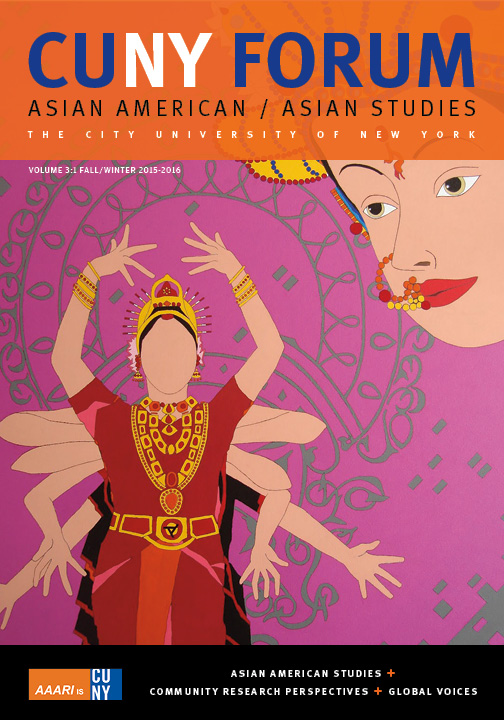Purchase: CUNY FORUM Volume 3:1
AAARI’s third issue of CUNY FORUM commemorates and examines the history of Asian American Studies on the East Coast during the tumultuous time of the Civil Rights Movement to the present. Learn from leading scholars and pioneers in the field about the future of Asian American and South Asian Studies in research, teaching, and education.
- CUNY and YALE – Discover how the first classes in Asian American Studies began over 45 years ago from the pioneers who taught them. In 1970, Betty Lee Sung taught the first classes in Asian American Studies at publicly funded The City University of New York. About the same time, Don T. Nakanishi recounts the first classes at Yale University.
- Education and Liberation – Phil T. Nash delivers a blueprint for teaching Asian American Studies based upon a liberatory education model – a model also used and written about by early Asian American Studies student activist (Yale University) Glenn Omatsu, based now in California. Omatsu envisions Asian American Studies movements post 1990s and during a time of growing inequality, wars, economic upheavals, environmental disasters and assaults on human rights.
- Interdisciplinary Research – John Chin, Margaret M. Chin, Tarry Hum and Peter Kwong, are CUNY scholars who joined together to form Mapping Asian American New York (MAANY), a CUNY-based interdisciplinary research collective that focuses on Asian American communities in New York City. They, together with Zai Liang from SUNY Albany, share cutting-edge community-based research methods and tell “Tales from the Field” as activist scholars.
Writers, artists, and scholars examine Asian American and South Asian Studies in global communities:
- Ellis Island Historian Judy Yung writes exclusively for CUNY FORUM about translations of poems discovered on the walls of the Ellis Island immigration station. The poems tell the stories of the experiences, anxieties, struggles, and hardships of Chinese immigrants who came through Ellis Island in the early 20th century. She is interviewed by Shan Te-hsing, an award-winning scholar of Asian American Literature from Taiwan.
- Amitava Kumar, award-winning writer, chronicles the rise of Jitan Ran Manjhi, a leader in Bihar who came from an impoverished background where he “grew up catching and eating rats” and rose to his current position as Chief Minister of Bihar in eastern India.
- Prema Ann Kurien, the Dr. Thomas Tam Visiting Professor at AAARI/CUNY, shares research and new scholarship on the role that religion and migration patterns have had during pre-and post-colonial times to structure adaptive patterns among South Asians.
- Vinit Parmar gives a rich and personal narrative of his current passion to make documentary films on the environment and social change in the U.S. and India.
- Rahul Mehra contributes two paintings from the traveling exhibition, “Erasing Borders Exhibition of Contemporary Indian Art,” to the front and back covers of the current issue of CUNY FORUM.
Others in this issue include poets R. Zamora Linmark and Xinqiu Xie; Chin Woon Ping, who writes prose and poetry linked to her own tragic family history of deaths from opium and opium in Malacca, Malaysia; and social scientist and professor Ming Xia who provides an in-depth review of Selling Sex Overseas: Chinese Women and the Realities of Prostitution and Global Sex Trafficking, by Ko-lin Chin and James O. Finckenauer.
The 152 page journal (Volume 3:1, Fall 2015 to Winter 2016, ISSN: 2329-1125, $15.00) features three sections, each examining through essays, interviews and poetry: 1. Asian Pacific American Studies; 2. Community Research Perspectives; and 3. Global Voices: Asia, Africa and the Americas
Online Preview Vol 3:1
Editor-In-Chief: Russell C. Leong
Publisher: Joyce O. Moy
Assistant Publisher: Antony Wong
Editorial Assistant: Loretta Chin
Proofreader: J. Mayor
Journal Design: William Tam & Antony Wong
Information Technology: Zhu-Hui Wu
Editorial Board:
Meena Alexander (Hunter College/CUNY & CUNY Graduate Center), Moustafa Bayoumi (Brooklyn College/CUNY), Luis H. Francia (Hunter College/CUNY & NYU), Kenneth Guest (Baruch College/CUNY), Jennifer Hayashida (Hunter College/CUNY), Evelyn Hu-Dehart (Brown University), Ravi Kalia (City College of NY/CUNY), Peter Kiang (UMASS-Boston), Amitava Kumar (Vassar College), Peter Kwong (Hunter College/CUNY & CUNY Graduate Center), Kyoo Lee (John Jay College of Criminal Justice/CUNY), Pyong Gap Min (Queens College/CUNY), Konrad Ng (Smithsonian Institution), Betty Lee Sung (Prof. Emerita, City College of NY/CUNY), John Kuo Wei Tchen (NYU) & David K. Yoo (UCLA)

